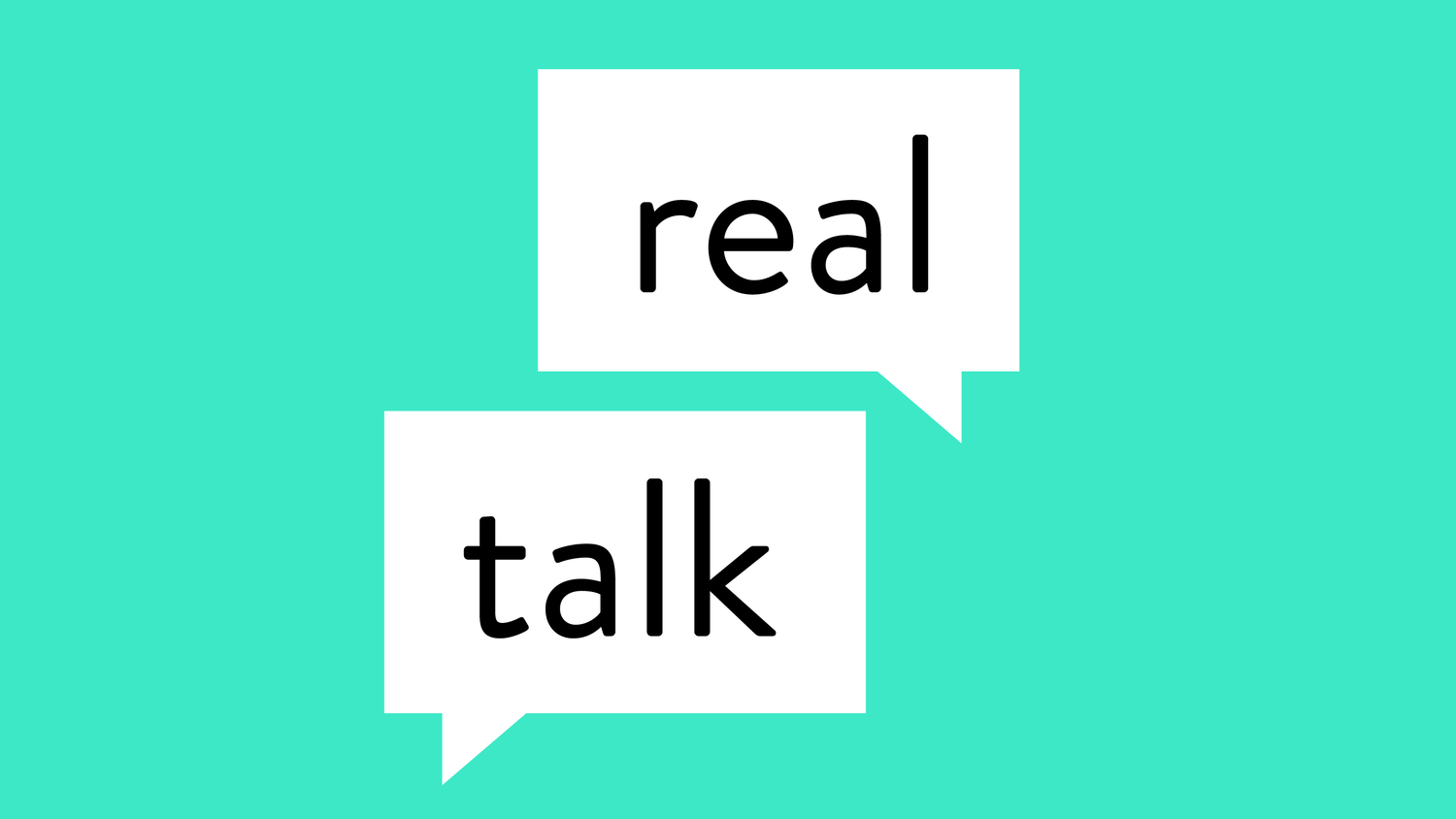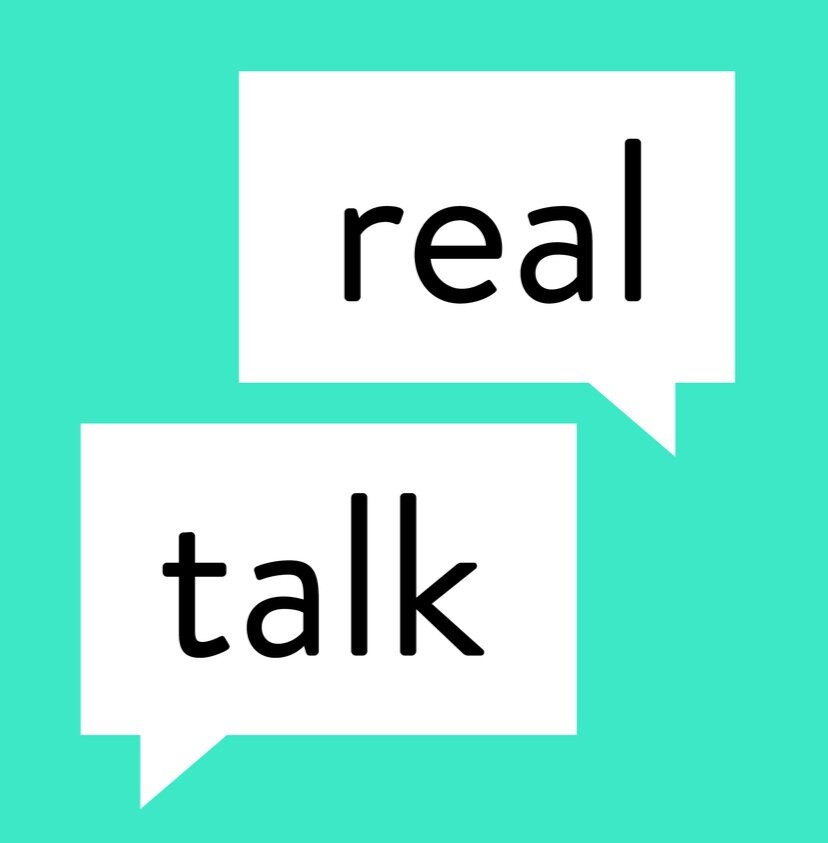Sharing Key Insights from Our Real Talk High School Interns
During Spring of 2022, Real Talk hosted an internship program with two queer high school students from a school in Northern California. This internship lasted 13 weeks and was filled with interactive activities during weekly remote meetings with the Real Talk team. The two interns contributed to various activities that primarily focused on understanding mental health needs for LGBTQ+ youth.
Activities & Learning Questions
Together, we applied a human-centered design (HCD) approach to examine queer youth mental health and wellbeing while taking these questions into consideration:
How can we use technology to better support queer youth mental health?
What are the stages of the (queer) mental health journey?
The interns started off with completing photo journals and diagrams, and exploring Real Talk stories written by LGBTQ+ youth. Together, we identified key factors from these activities that are the most impactful to youth mental health and wellbeing overall. They also identified gaps that exist in current resources and support for LGBTQ+ youth. We then brainstormed solutions for how to fill those gaps at Real Talk. We closed up the last few weeks of our internship with reflecting, reviewing, and gathering feedback from teens. The interns contributed creative ideas and shared key themes from our work together that highlighted the need for more meaningful support for queer youth. As the final product for the internship, both interns worked together and created a journey map about the queer mental health journey. Below you can see some of the the themes and insights that informed the final products.
What We Learned: Emotions & Needs
Through stories, journals, and insightful HCD activities with the interns, we identified the following key emotions and needs among queer youth:
Community & Authentic Connection
Queer teens are lacking meaningful community. They have trouble fitting in with peers and feeling understood in all aspects of their identity. Being surrounded by other queer youth is refreshing and needed, but rare.
Queer teens generally need more sources of authentic support and care. They may be surrounded by friends and classmates, but these connections often do not provide the type of care that they need most. Authentic connection means queer teens feel seen and heard regardless of their situation.
Hope & Reassurance
Queer teens want hope and reassurance that they can find happiness. They want to hear from older queer folks who made it out of difficult times during their youth. Also, teens want more stories about happy queer couples to reassure them that loving relationships are possible.
Safety & Privacy
Queer teens lack spaces with true physical and emotional safety. They want better mental and physical health support at school. They also need adults in their lives who are more understanding of and responsive to their needs.
Social media is not always helpful to teens, especially queer teens who are navigating their identity. It is easy to feel like everyone is watching and judging based on what is happening on social media. Queer teens need safe spaces where they can feel supported by an inclusive online audience.
These emotions are key drivers of the queer youth experience. In order to effectively support them in addressing these needs, we need to take each of these into account when designing programs and services for queer teens.
What We Learned: Key Insights
After learning about the gaps in support for queer youth, the interns also shared new insights for Real Talk to consider to better support and serve LGBTQ+ youth. We learned that:
Social media does not equal community
Social media is one way to connect with teens, but it is not the only way. It can be difficult to have authentic connections online, especially when it comes to personal issues. Sometimes teens want to stay anonymous. There is a need for creative avenues to reach and connect with teens that do not center around social media channels.
Sharing the same story & experience is tiring
Having to re-tell your coming out story and experience when looking for support can be exhausting. We need to find new ways of engaging with queer teens that do not require them to recount difficult and traumatic experiences. Instead, we can focus on creating safe spaces to celebrate queerness and learn about positive aspects of the queer experience.
Most big picture LGBTQ+ support is performative
Many schools and organizations have made important changes to their programs, curriculum, and messaging for queer teens. But, oftentimes these expressions of LGBTQ+ support are not enough to truly change the culture and norms that impact queer teens.
The social norms in schools center the heteronormative experience and adhere to the sexuality and gender binary. Beneath heteronormativity lies homophobia and transphobia. When schools do not have authentic safe spaces or LGBTQ+ inclusive culture and curriculum, it sends a hurtful message to their students.
One intern summarized it like this: It’s nice to have a GSA club at school, but if only 10 students out of 4,000 are a part of it – that doesn’t really make me feel safe.
Safety and authenticity are intertwined. In order to create safe and authentic spaces for queer teens, schools need to challenge the binary view of gender and sexuality diversity in school culture.
Connection and relationship building needs to come first
Many LGBTQ+ support programs, like GSA clubs and LGBTQ+ centers, can be stressful and scary at first. Queer teens are expected to join a group of strangers and engage in vulnerable, personal conversations before they have had a chance to build relationships with anyone. This is a significant barrier to participation and limits the overall helpfulness of these types of programs.
Providing one-on-one check-ins or having opportunities to build more genuine relationships could help teens feel supported going into these programs.
Moving forward, our interns inspired a couple of questions for Real Talk to consider further:
What does a supportive community look like for queer teens?
What does meaningful support look like?
Real Talk values working with teens and learning from their experiences in order to better support youth mental health and wellbeing. Our goal for this internship was to learn more about how Real Talk can better support and care for queer youth mental health. We achieved this goal with the help of our interns who brought valuable ideas and a fresh perspective to Real Talk about queer mental health, which inspired new insights and questions. Real Talk will incorporate all that we learned from the internship for future programs and partnerships. We can’t wait to get started on the next steps and continue to share what we learned with our community!
In this learning journey together,
Arleth & the Real Talk team
P.S. There are lots of ways to support our work further – whether through financial support or partnering with us to bring Real Talk to teens in your community. Email us with any inquiries at hello@myhealthed.org


